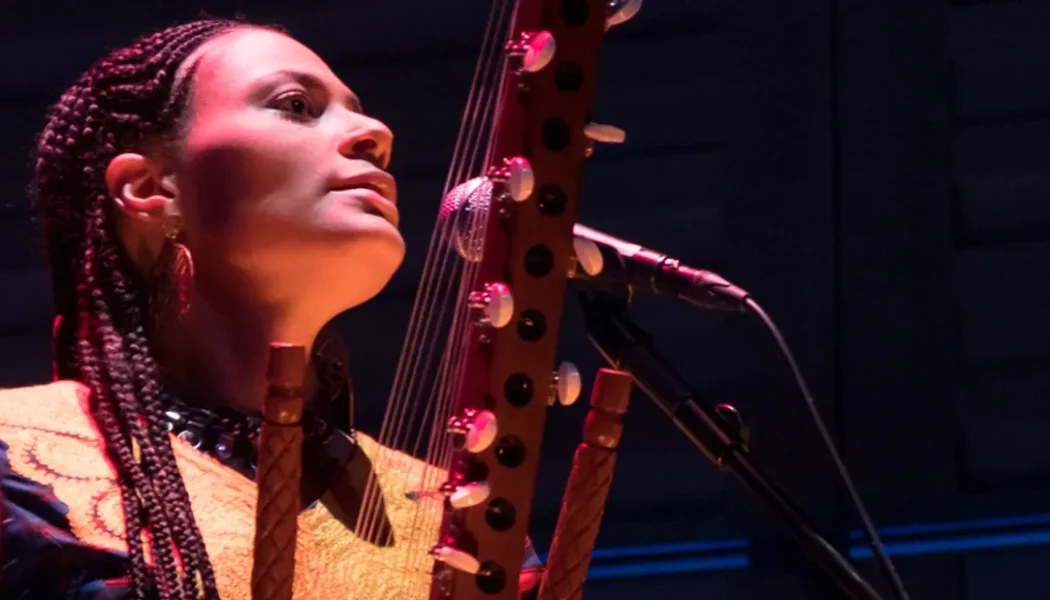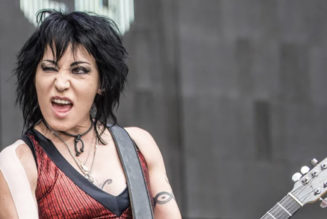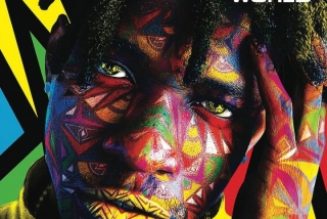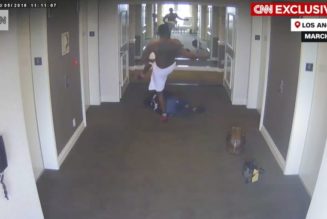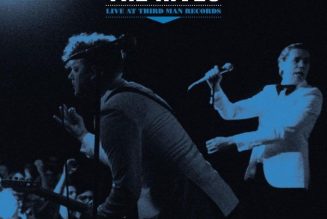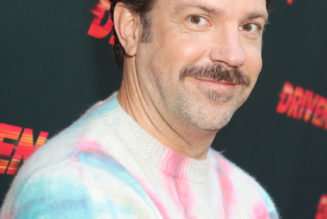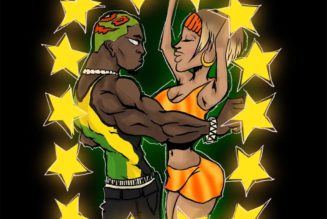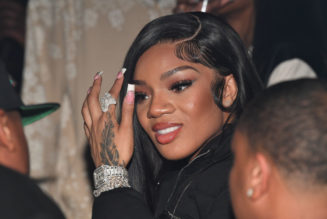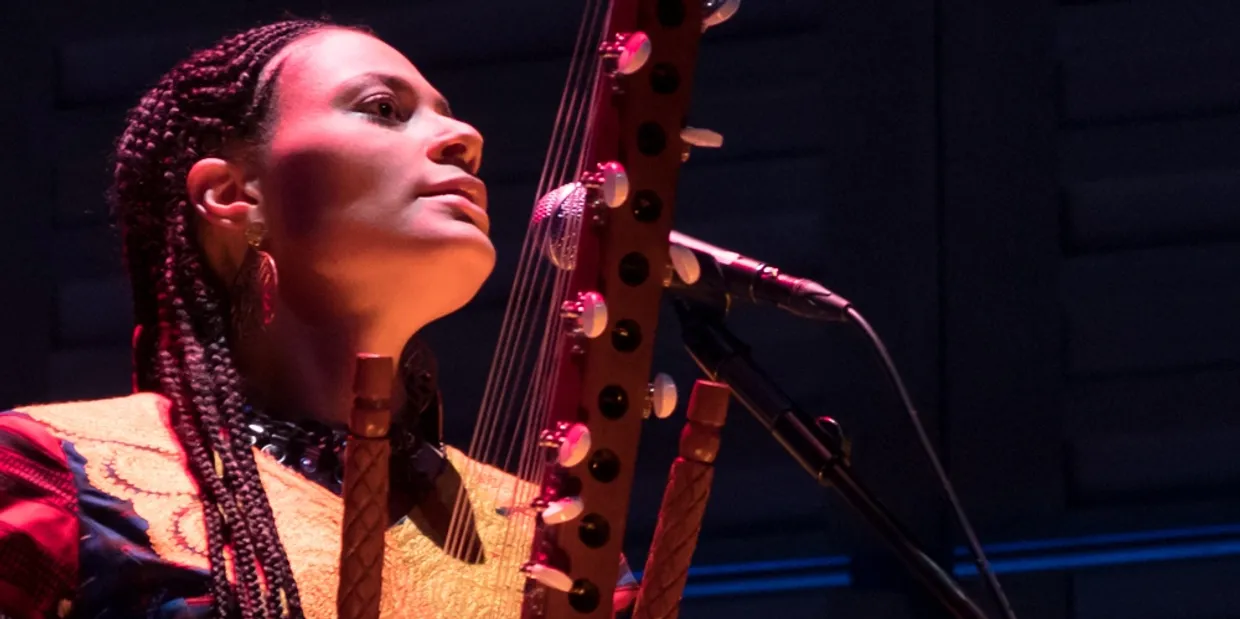
Hejira world music radio show host Jeff Spitzer-Resnick recently caught up with Sona Jobarteh, the pioneering woman kora player from the Gambia, while she was in London, getting ready to embark on a US tour. She is playing at the Garver Feed Mill on March 21st. This interview originally aired on March 16th and has been lightly edited for clarity.
JSR: I’m very excited to have Sona Jobarteh from the Gambia here. She’s actually in London right now, and she’ll be in the States soon playing at the Garver Feed Mill on Tuesday. Welcome, Sona.
SJ: Thank you.
JSR: So, much has been made of you being unique in terms of being a woman, kora player, and people can go online and find many interviews about that. But what I’d like to ask you, something perhaps a little different, is what message does it send with you as a woman kora player, that perhaps when a man plays the kora, and of course there’s many great kora players out there, but what message does that send perhaps to the women of Africa and maybe even the women of the world?
SJ: Well, I think maybe on three levels we have like within our own culture, it sends a very strong message to women who are from that tradition and from that social norm that there is now a shift and a change and a growing acceptance I think for women to take part in this tradition where they haven’t done before.
I think on an Africa level, it also speaks to women of Africa who come from similar traditions, who may have similar kinds of backgrounds where women may not be involved in certain aspects of the culture, the tradition, and to maybe inspire them to question that or to maybe challenge that in different ways.
And obviously on a global level, I think that it speaks to many women around the world who equally have similar stories to tell, not just within music, but in many different sectors of life that it offers some kind of inspiration, encouragement to break social norms and raise questions where people may not have raised those questions before.
JSR: And since you’ve achieved some kind of stardom have you seen more girls and women in Africa playing the kora?
SJ: I’m sure it’s happening. I haven’t had my nose close to the ground in terms of checking up on those stats. But from a very immediate level, I have a number of female students, you know, in my academy in the Gambia. So, they too are starting to set that new trend.
And I see them also as being people who also will go on to encourage other girls within the country to, to do the same.
JSR: That’s fantastic. I didn’t realize you had a music academy. So, is that what you do between gigs?
SJ: It’s actually my main occupation. My shows are what is in between.
JSR: I see.
SJ: Yeah, it’s not a music academy. It’s actually an academy for education. Music, of course, plays a role within that. It’s an academy of full-time education to young people.
JSR: And what caused you to start this academy? How long has it been going?
SJ: I opened in 2015. The main motivation behind studying this academy was actually to set up a new a new take on a curriculum within Africa, one that centers itself academically on the culture and identity and traditions of Africans.
JSR: Is that to kind of push back against the legacy of colonialism where African history and culture really was not honored?
SJ: Very much so. I mean, we’ve had so much innovation and so much progress that’s been made within the education system in Africa. However, I’ve always felt that it’s very much about building on a broken model. So my ambition with this academy was to really rebuild the curriculum completely from the ground up, taking into consideration the culture and the orientation of the people that it’s tough to teach.
JSR: That’s fantastic. How many students do you have at the academy?
SJ: At the moment, I’m keeping it on a pilot scheme because of the fact that I’m developing the actual curriculum, which its aim is to be scalable and taken to other schools across the country and into other countries on the continent.
So, I’m keeping student level below 30. However, right now we’re just about to break ground actually on the main campus, and that will have a capacity of 250 students.
JSR: Wow! Fantastic! I wish you the best of luck. Now let’s get to your music and your upcoming concert. So first of all, tell us, are you traveling with a band and if so, what does the band consist of? What can people expect to see when they come to see you?
SJ: Yeah, so I’ll be coming with my full band because I’ll be performing music from the forthcoming album. In fact, it’s no longer forthcoming. I’m so used to saying that it’s now out.
I always find it a little bit hard to explain what it is because it has a modern feel or a modern take to a very traditional sound. But you know, for me, I often like people to make their own judgements on what they feel that it is.
JSR: Speaking of that, I’m actually glad you brought up the modern take on a traditional sound. Are the songs that you’re going to be playing; are they your songs, are they traditional songs? Are they updated traditional songs? A mix?
SJ: So, on the new album they’re all original songs. There are no songs that are drawn on the traditional ones. Unlike the first album where I did rewrite some of the traditional songs.
JSR: Got it. One thing that I think is challenging for many audiences and certainly even audiences of my own show since I have a world music show, is they hear beautiful music from all over the world, but it’s not in their language.
So, can you tell us if you’re perhaps trying to get a message through your music, but people may not understand it if they’re not familiar with the language?
SJ: Sure. I mean, it is every song. A major thing for me when I wrote this new album was that every song actually has a message and a very strong one. So that really is a very essential key part of my new album. And that’s, again, mainly based on the fact of the work that I do, which is actually the work, right?
This is work that’s actually manifesting in real life, in people’s lives in society. I see music as something that serves that purpose and actually one of the most powerful forms of artistry and communication that we can use to harness, and to be able to spread messages around the world to give empowerment to people also around the world in line with the things that you’re trying to promote or the things that you’re trying to change.
So, for me personally, this includes of course you touched on it already, inspiring young women, young females, or not just young females, but females in general, in terms of their goals and the commitment that they want to put into things that perhaps might not be part of the status quo. But also, wider than that, also massively of importance to me is education, which is a very reason I opened the academy. So, there is a song that’s dedicated to the importance of education and reassessing what that means for Africans. And there’s a song, for example, that talks about the responsibility of musicians, artists, actually people, not just musicians, but artists in general to understand their role within the world as ambassadors, as people who have and carry that responsibility to actually communicate in positive and constructive ways because of the fact of understanding or furthering that role that they have. Those are just a few. Obviously, there’s 13 tracks on the album, so there’s a lot of different themes, which I think may not be space to go into at this point in time. But just to give you a snapshot of some of them.
JSR: Thank you. I appreciate that. One thing I’ve noticed recently, and you’re certainly among the African musicians, female musicians who are doing this, is we see bands Le Amazones d’Afrique, and I was just watching a concert of Angelique Kidjo in Hamburg from just three days ago where she had Dobet Gnahoré and other women from Africa singing with her. There seems to be a movement that you’re a part of to really highlight and empower African women. So, one question I have for you is whether there are other African women musicians who you would like your listeners to know about in addition to yourself?
SJ: Wow! That’s the question! Usually, I like to have a little bit more time to think because as soon as I say it, I think of like 15 other people I should have said. But obviously, I mean, well from my sort of immediate tradition, and she’s doing incredibly well already, there’s Fatoumata Diawara, I’ve always loved her. But you know, I grew up listening to people like, Oumou Sangaré from the previous generation. As a pioneer, as a woman, as a kind of iconic female artist from my tradition, of course, that was influential to me but not within my tradition. But, also within my tradition, I would say Kandia Kouyaté, again from the older generation who are really, again, role models to people like myself within my own tradition. So, I’ve just named some that are all from within my tradition, just because it’s easier. But there are a host of other women, of course, that I, of course have followed throughout my life in, from other genres, from all over the world.
JSR: Fair enough, it’s been a great pleasure to have you Sona, And I look forward to your concert. We’ll play some of your music coming up right next.
SJ: Great.
Check out a recent performance of Sona Jobarteh and her band at the African Music Festival in The Netherlands from June, 2022 by clicking here.
